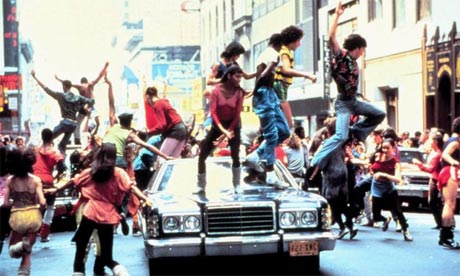Readers recommend: Songs about fame
Your whitest, emptiest smile possible please. This week it's all about the effects of celebrity

Lighting up the sky like a flame ... These kids will leap over cars to be famous. Photograph: Allstar/Cinetext/MGM
There's a lot of strife in the world of songs about social class, but most of it's in the past. Class as an issue has almost come full circle now; it's not something that's talked about, or even discussed much. What does the working class do when there's no work? What does the middle class do when all their assets have melted into an ocean of debt? Who's left to care other than the idle rich and the idle poor, both watching, detached, from the sidelines.
There was a brilliant response this week. We had arguing, even the hint here and there of a possible tantrum. The issues around class can do this – quite understandably – so it seemed best to sort out some rules. Writing a song about being poor doesn't count, although writing a song about being rich probably would. Looking around you, open-mouthed, at all the inequality definitely does.
Pulp's Common People was only held off the A-list due to excessive over-playing, but, despite that, it still explodes with fury at the glaring, humiliating injustices that come between the two lovers. If only someone had told McCarthy, whose wonderful We Are All Bourgeois Now declares, "Once there was class war, but not any longer".
It was, of course, the Temptations who saw through the middle-class temptation of reckless consumption. "It only makes your life a mess," they sing, "bill collectors, tranquilisers and gettin' deeper in debt …" Noel Coward could teach us all about the traps wealth and privilege can set. In the ("frequently mortgaged to the hilt") Stately Homes of England he admits that even if the "Van Dycks have to go, and we pawn the Bechstein Grand, we'll stand, by the stately homes of England".
The Auteurs stare at The Upper Classes and, over a melody that is Radiohead's Creep in all but name, offer the pearl, "There's nothing wrong with inherited wealth, if you melt the silver yourself". Poet Linton Kwesi Johnson looks at Di Black Petty Booshwah and notes with horror as this new class automatically, "side wid oppressah, w'en di goin' get ruff."
The working-class woman at the centre of the Kinks' She's Bought a Hat Like Princess Marina wears her elaborate headwear just to do the cleaning, while her husband wants a Bentley "like Anthony Eden". There's a similarly resigned sadness to Shack's High Rise – Low Life, which says, "If you can build here, then make yourself a home".
Finally, some drama. Cher's Gypsies, Tramps and Thieves deals with those that live outside conventional society, an underclass by any other name, while the Who's The Dirty Jobs looks at downtrodden pigmen, bus drivers and miners but sees change coming, "My life's fading, but things are changing, I'm not gonna sit and weep again".
This week I'm after songs about the effects of fame. We know that celebrity is a mask that eats into the face, but what does it do to the soul? When you've desired something, worked for something for so long, then achieved it only to find it's entirely hollow and meaningless, what do you do? Then again, maybe fame is amazing. Maybe it's the only thing worth working for. Who's had something enlightening to say on the subject?
Deadline is midday Monday; please note that posts should not contain more than a third of a song's lyrics. The A-Z and RR archive are having a caviar facial, while the Overspill blog has an urgent appointment with its agent. What's your name?
Cap comentari:
Publica un comentari a l'entrada